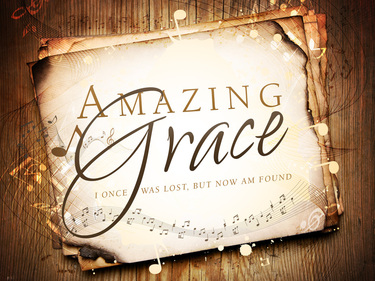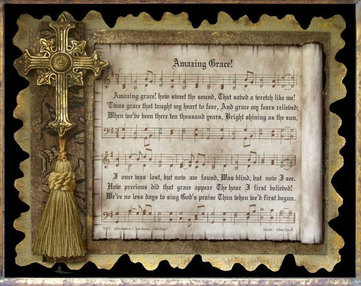Amazing Grace
|
Amazing grace is one of the best known christian hymns in the English-speaking world. The text was written by the English poet and clergyman John Newton (1725-1807) and published for the first time in 1779. The words describe the move of a "wretch" from a "lost" to a "found" state by a merciful act of God.
The melody "New Britain" was published for the first time in 1829 by C. H. Spilman and B. Shaw. There is no composer known, the melody combines two earlier melodies, "Gallaher" and "St. Mary", and possibly represents a confluence of oral traditions. In 1835 Newton's text was added to "New Britain" by the composer William Walker to form the hymn we all know today. Amazing Grace is Newton's spiritual autobiography in verse. |
Newton was born in 1725 in a district near to London. His mother died of tubercolosis when he was only 6 years old. The next years he was raised by his emotionaly distant stepmother, while his father was at see, and spent some time at a boarding school where he was mistreated. He grew up with no particular religious alignment and at the age of eleven, he joined his father on a ship as an apprentice. His carreer at see would be marked by headstrong disobedience.
As a sailor and under influence of a shipmate Newton denounced his faith. He renounced all hopes and comforts of the Gospel and he relapsed into bad habbits. His disobedience caused him to be pressed into the Royal Navy and he took advantage of opportunities to overstay his leave. Finaly he deserted his service to visit Mary Catlett, a family friend with whom he had fallen in love. After enduring humiliation for deserting he managed to get himself traded te a slave ship, where he began a carreer in slave trading..
Newton openly mocked the captain, creating obscure poems and songs that became so popular that the crew began to join in. His behaviour resulted in his being starved almost to death, imprisoned and chained like the slaves while at sea. Finaly he was forced to work on a plantation in Sierra Leone. After several months he started to see Sierra Leone as his home, but his father intervened after a letter Newton had written to him, describing his circumstances. A ship found him by coincidance.
As a sailor and under influence of a shipmate Newton denounced his faith. He renounced all hopes and comforts of the Gospel and he relapsed into bad habbits. His disobedience caused him to be pressed into the Royal Navy and he took advantage of opportunities to overstay his leave. Finaly he deserted his service to visit Mary Catlett, a family friend with whom he had fallen in love. After enduring humiliation for deserting he managed to get himself traded te a slave ship, where he began a carreer in slave trading..
Newton openly mocked the captain, creating obscure poems and songs that became so popular that the crew began to join in. His behaviour resulted in his being starved almost to death, imprisoned and chained like the slaves while at sea. Finaly he was forced to work on a plantation in Sierra Leone. After several months he started to see Sierra Leone as his home, but his father intervened after a letter Newton had written to him, describing his circumstances. A ship found him by coincidance.
|
While aboard of the ship "The Greyhound", Newton gained notoriety for being the most profane man the captain had ever met. Where sailors commonly used oaths and swore, Newton not only used the worst words the captain had ever heard, but he created new ones to exceed the limits of verbal debauchery.
In March 1748, while the Greyhound was in the North Atlantic, a violent storm came upon the ship. It was so rough that it swept overboard a crewmember who was standing where Newton had been only a moment before. After houres of the crew emptying water from the ship and expecting to be capsized, Newton and another mate tied themselves to the ship's pumps in order to prevent they were swept overboard while working. At that point Newton said "Iff this wont do, God have mercy on us!" |
As they had landed safely, the memory of the uttered phrase in a moment of desperation did not leave Newton: he began to ask himself if he was worthy of God's mercy as he had not only neglected his faith, but openly opposed it, mocking others who showed theirs and denouncing God as a myth. He came to believe that God had sent him a profound message and had begun to work through him. From that moment Newton took life more seriously. He married Polly, he worked on slave ships, now as a captain, till at the age of thirty he collapsed and never sailed again.
Newton teached himself Latin, Greek and theology. His passion was so impressive his friends suggested he would become a priest in the church of England, but he was turned down by the bisschop of York, for not having a university degree. Newton continued his devotions, he wrote about his experiences in the slave trade and his conversion. Impressed by this story, the Earl of Dartmouth offered him the curacy of Olney, Buckingham shire in 1764. The people of Olney was mostly illiterate and poor. Newton's preaching was unique: he shared many of his own experiences, he was involved in his parishioners' lives and was much loved.
Newton struck a friendship with W. Cowper, a gifted writer who suffered bouts of insanity, attemting suicide several times and who had gone through a spiritual conversion similar to Newton's. Together they started writing hymns. Amazing Grace was written to illustrate a sermon on New Year's Day of 1773.
Source: http://en.wikipedia.org/wiki/Amazing_Grace
Newton teached himself Latin, Greek and theology. His passion was so impressive his friends suggested he would become a priest in the church of England, but he was turned down by the bisschop of York, for not having a university degree. Newton continued his devotions, he wrote about his experiences in the slave trade and his conversion. Impressed by this story, the Earl of Dartmouth offered him the curacy of Olney, Buckingham shire in 1764. The people of Olney was mostly illiterate and poor. Newton's preaching was unique: he shared many of his own experiences, he was involved in his parishioners' lives and was much loved.
Newton struck a friendship with W. Cowper, a gifted writer who suffered bouts of insanity, attemting suicide several times and who had gone through a spiritual conversion similar to Newton's. Together they started writing hymns. Amazing Grace was written to illustrate a sermon on New Year's Day of 1773.
Source: http://en.wikipedia.org/wiki/Amazing_Grace
|
Lyrics
Amazing Grace, how sweet the sound, That saved a wretch like me. I once was lost but now am found, Was blind, but now I see. T'was Grace that taught my heart to fear. And Grace, my fears relieved. How precious did that Grace appear The hour I first believed. Through many dangers, toils and snares I have already come; 'Tis Grace that brought me safe thus far and Grace will lead me home. The Lord has promised good to me. His word my hope secures. He will my shield and portion be, As long as life endures. Yea, when this flesh and heart shall fail, And mortal life shall cease, I shall possess within the veil, A life of joy and peace. Yes, when this flesh and heart shall fail, And mortal life shall cease; I shall profess, within the vail, A life of joy and peace. The following stanza was written by an anonymous author, often replacing the sixth stanza, or inserted as the fourth. When we've been there ten thousand years Bright shining as the sun. We've no less days to sing God's praise Than when we've first begun. |
|


